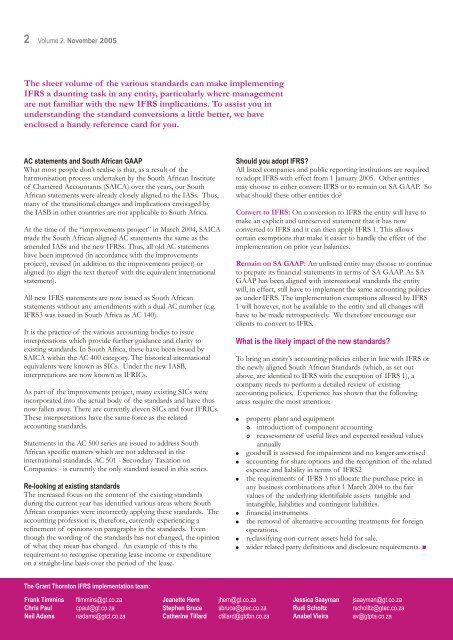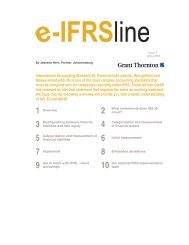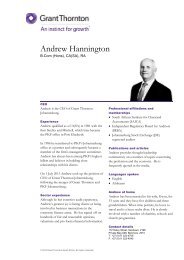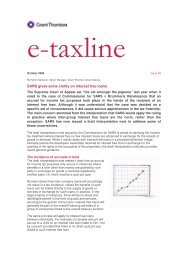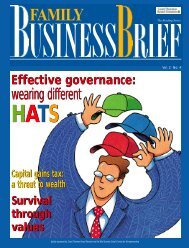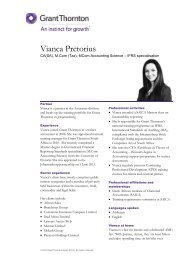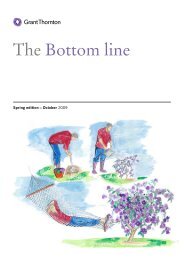IFRS - there's nowhere to hide - Grant Thornton
IFRS - there's nowhere to hide - Grant Thornton
IFRS - there's nowhere to hide - Grant Thornton
You also want an ePaper? Increase the reach of your titles
YUMPU automatically turns print PDFs into web optimized ePapers that Google loves.
2<br />
Volume 2. November 2005<br />
The sheer volume of the various standards can make implementing<br />
<strong>IFRS</strong> a daunting task in any entity, particularly where management<br />
are not familiar with the new <strong>IFRS</strong> implications. To assist you in<br />
understanding the standard conversions a little better, we have<br />
enclosed a handy reference card for you.<br />
AC statements and South African GAAP<br />
Should you adopt <strong>IFRS</strong><br />
What most people don't realise is that, as a result of the<br />
All listed companies and public reporting institutions are required<br />
harmonisation process undertaken by the South African Institute <strong>to</strong> adopt <strong>IFRS</strong> with effect from 1 January 2005. Other entities<br />
of Chartered Accountants (SAICA) over the years, our South may choose <strong>to</strong> either convert <strong>IFRS</strong> or <strong>to</strong> remain on SA GAAP. So<br />
African statements were already closely aligned <strong>to</strong> the IASs. Thus, what should these other entities do<br />
many of the transitional changes and implications envisaged by<br />
the IASB in other countries are not applicable <strong>to</strong> South Africa. Convert <strong>to</strong> <strong>IFRS</strong>: On conversion <strong>to</strong> <strong>IFRS</strong> the entity will have <strong>to</strong><br />
make an explicit and unreserved statement that it has now<br />
At the time of the “improvements project” in March 2004, SAICA converted <strong>to</strong> <strong>IFRS</strong> and it can then apply <strong>IFRS</strong> 1. This allows<br />
made the South African aligned AC statements the same as the certain exemptions that make it easier <strong>to</strong> handle the effect of the<br />
amended IASs and the new <strong>IFRS</strong>s. Thus, all old AC statements implementation on prior year balances.<br />
have been improved (in accordance with the improvements<br />
project), revised (in addition <strong>to</strong> the improvements project) or Remain on SA GAAP: An unlisted entity may choose <strong>to</strong> continue<br />
aligned (<strong>to</strong> align the text thereof with the equivalent international <strong>to</strong> prepare its financial statements in terms of SA GAAP. As SA<br />
statement).<br />
GAAP has been aligned with international standards the entity<br />
will, in effect, still have <strong>to</strong> implement the same accounting policies<br />
All new <strong>IFRS</strong> statements are now issued as South African<br />
as under <strong>IFRS</strong>. The implementation exemptions allowed by <strong>IFRS</strong><br />
statements without any amendments with a dual AC number (e.g. 1 will however, not be available <strong>to</strong> the entity and all changes will<br />
<strong>IFRS</strong>3 was issued in South Africa as AC 140).<br />
have <strong>to</strong> be made retrospectively. We therefore encourage our<br />
clients <strong>to</strong> convert <strong>to</strong> <strong>IFRS</strong>.<br />
It is the practice of the various accounting bodies <strong>to</strong> issue<br />
interpretations which provide further guidance and clarity <strong>to</strong><br />
existing standards. In South Africa, these have been issued by<br />
What is the likely impact of the new standards<br />
SAICA within the AC 400 category. The his<strong>to</strong>rical international To bring an entity's accounting policies either in line with <strong>IFRS</strong> or<br />
equivalents were known as SICs. Under the new IASB,<br />
the newly aligned South African Standards (which, as set out<br />
interpretations are now known as IFRICs.<br />
above, are identical <strong>to</strong> <strong>IFRS</strong> with the exception of <strong>IFRS</strong> 1), a<br />
company needs <strong>to</strong> perform a detailed review of existing<br />
As part of the improvements project, many existing SICs were accounting policies. Experience has shown that the following<br />
incorporated in<strong>to</strong> the actual body of the standards and have thus areas require the most attention:<br />
now fallen away. There are currently eleven SICs and four IFRICs.<br />
These interpretations have the same force as the related property plant and equipment<br />
accounting standards. introduction of component accounting<br />
reassessment of useful lives and expected residual values<br />
Statements in the AC 500 series are issued <strong>to</strong> address South<br />
annually<br />
African specific matters which are not addressed in the goodwill is assessed for impairment and no longer amortised<br />
international standards. AC 501 - Secondary Taxation on accounting for share options and the recognition of the related<br />
Companies - is currently the only standard issued in this series.<br />
expense and liability in terms of <strong>IFRS</strong>2<br />
the requirements of <strong>IFRS</strong> 3 <strong>to</strong> allocate the purchase price in<br />
Re-looking at existing standards<br />
any business combinations after 1 March 2004 <strong>to</strong> the fair<br />
The increased focus on the content of the existing standards<br />
values of the underlying identifiable assets tangible and<br />
during the current year has identified various areas where South intangible, liabilities and contingent liabilities.<br />
African companies were incorrectly applying these standards. The financial instruments<br />
accounting profession is, therefore, currently experiencing a the removal of alternative accounting treatments for foreign<br />
refinement of opinions on paragraphs in the standards. Even<br />
operations.<br />
though the wording of the standards has not changed, the opinion reclassifying non-current assets held for sale.<br />
of what they mean has changed. An example of this is the wider related party definitions and disclosure requirements.<br />
requirement <strong>to</strong> recognise operating lease income or expenditure<br />
on a straight-line basis over the period of the lease.<br />
The <strong>Grant</strong> Thorn<strong>to</strong>n <strong>IFRS</strong> implementation team:<br />
Frank Timmins ftimmins@gt.co.za Jeanette Hern jhern@gt.co.za Jessica Saayman jsaayman@gt.co.za<br />
Chris Paul cpaul@gt.co.za Stephen Bruce sbruce@gtec.co.za Rudi Scholtz rscholltz@gtec.co.za<br />
Neil Adams nadams@gtct.co.za Catherine Tillard ctillard@gtdbn.co.za Anabel Vieira av@gtpta.co.za


